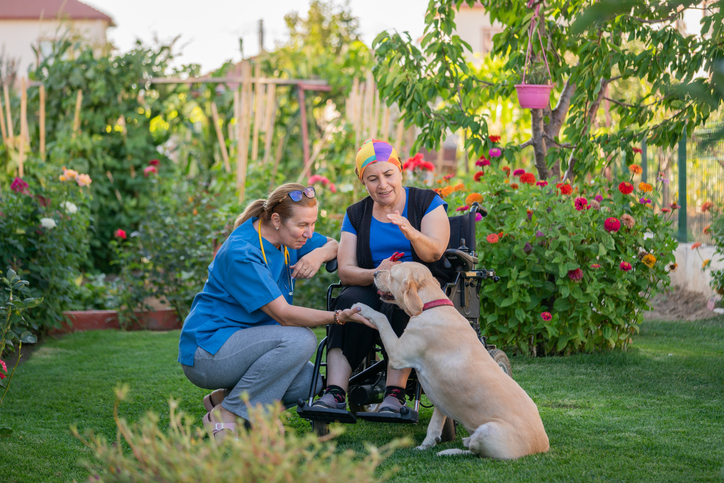Support At Home: Kitchen Confidential
It’s natural to exchange personal information when a support worker comes into your home, but they also need to maintain professional boundaries. After all, they are there to do a job: to help you retain or regain your independence!
Providing support gives an intimate glimpse into one another’s lives. A support worker’s role is different from many other jobs. They have personal contact with their clients, close contact with clients’ families, and their workplace is their client’s home, a very important symbol of independence.
And they carry the responsibility of providing care and support for people who are at a vulnerable stage of their lives. Clients trust those who come into their homes to hold information about them in complete confidence.
That’s why organisations that provide support services have clear policies to ensure staff do not discuss any information about a client with anyone except a clinician or others who help to support the person.
Support workers are trained to understand that they are a guest in clients’ homes and are expected to be polite, get a sense of clients’ likes and dislikes, and be willing to accept another point of view.
Providing support is about more than completing personal care or household tasks. Listening and communicating with clients is an intrinsic, highly valued part of the job.
When people are a bit down or have perhaps just lost a partner, they need someone to talk to. For some, the support worker visit may be the only contact they have all week, especially in isolated or rural areas or if their families do not live nearby.
Friendly communication is naturally going to occur, and is encouraged. But because it’s such a two-way relationship, which depends on goodwill and integrity on both sides, it is important that both the client and support worker keep any personal information they share with each other to themselves.
Sometimes it may be tempting for clients to seek advice, or discuss topics that may be deeply personal. Staff are asked to gently steer clients away from this, as it can place them in a difficult or compromising position.
If their client has a medical query, support workers are encouraged to refer these to a community nurse.
Support workers also understand that it is inappropriate for them to discuss their own personal information or problems with clients. Strong bonds can form between support workers and their clients. It is important that these relationships are carefully managed and treated as a professional partnership rather than a personal friendship, which could be counterproductive for a client who is trying to restore independence.
In some instances, especially with long-term care, support workers often ‘go the extra mile’ to help clients. And it is the little caring things that can make such a difference to clients’ lives, and are much appreciated. But support workers must be mindful that what they do for their clients is bound by the agreed support plan.
They need to ensure they don’t end up offering extra help that can reduce the standard of care, undermine a client’s independence, or create pressure to complete their work in the allocated time.
To protect both parties, support workers receive training about how to maintain professional boundaries without sacrificing the caring relationships they often have with clients.
An inappropriate relationship with a client or family member has risks for workers.
These might include:
- Increasing or unreasonable demands and expectations from the client or their family.
- High worker stress and burnout.
- Inability to provide professional, objective support.
- Difficulty setting limits and dealing with unfair behaviour.
- Favouring of certain workers over others.
- Distress when relationships break down.
- Grief and loss for clients when workers leave.
Tips for support workers
- It is important to be clear about your role and your client’s goals and objectives right from the beginning.
- Discuss your role with the client or family early on, and set limits about inappropriate or unreasonable requests.
- Keep your own family and personal life private and separate to your work; be careful about providing too much personal information about yourself or other workers.
- Respect confidentiality and privacy; do not discuss clients with others.
- Discuss any concerns or worries about your work, or relationships with clients, with your supervisor.
- Don’t give advice outside of your skills and expertise (financial, marital, relationship, medical); refer clients to qualified professionals for any support needed
- Do not borrow from, ask for, or lend money to clients, or talk about your personal, financial or other problems with them. Don’t ask for or accept gifts or special favours.
- Ask for help when you need it. Support work can be isolating, with high levels of independence and responsibility.
- Do not criticise, complain about or discuss issues relating to other workers, staff, or your employer with clients or their families. Work related issues and complaints should be dealt with in the workplace.
Signs of boundary problems
- Disclosing intimate personal information.
- Discussing personal, marital, financial or other problems.
- Visiting together outside of work time.
- Inviting one another to your homes or introducing each other socially to family members or friends.
- Referring to support workers as friends or ‘part of the family.
- Feeling that you are the only one who ‘understands’ the client.
- Offering/accepting money or gifts.
- A support worker staying for longer and longer after work time has finished.
- A support worker asking clients or their families for ‘favours’ with shift arrangements.
- Noticing feelings of friendship or sexual attraction.
